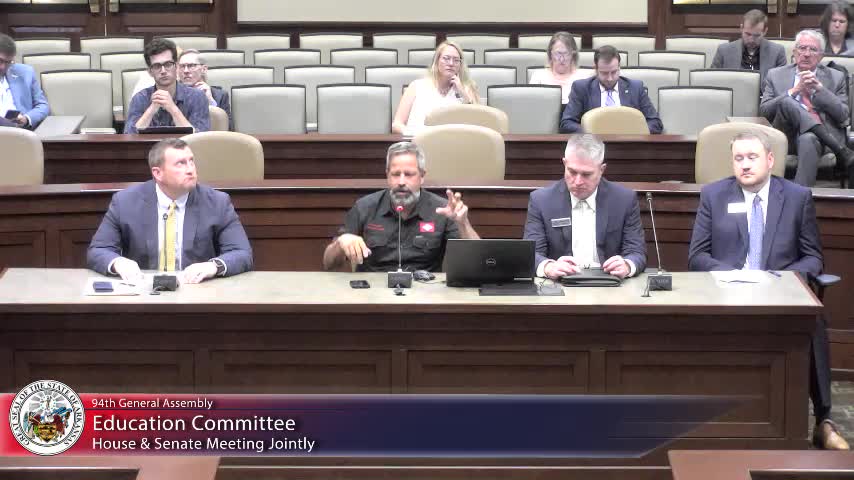Arkansas education panel discusses nursing program capacity and instructor shortages
September 05, 2023 | EDUCATION COMMITTEE - SENATE, Senate, Committees, Legislative, Arkansas
This article was created by AI summarizing key points discussed. AI makes mistakes, so for full details and context, please refer to the video of the full meeting. Please report any errors so we can fix them. Report an error »

In a recent meeting of the Arkansas Senate Education Committee, discussions centered on the pressing challenges facing the state's nursing programs and broader educational pathways. As the committee members gathered, the atmosphere was charged with urgency, reflecting the critical need for solutions in the face of a nursing shortage that has left many programs at capacity.
One of the key points raised was the struggle of nursing schools to accommodate more students due to staffing limitations. Many programs reported being full, not necessarily because of a lack of interest, but due to insufficient instructors and clinical placements. The conversation highlighted the complex interplay between funding, staffing ratios, and the ability to expand student enrollment. As one committee member noted, while schools may have the physical capacity for more students, the financial constraints often prevent them from hiring the necessary faculty to support increased enrollment.
The committee also explored innovative solutions to enhance nursing education, such as the "earn while you learn" model, which aims to allow students to work while completing their clinical training. This approach could help bridge the gap between education and employment, enabling students to transition smoothly from roles like Certified Nursing Assistants (CNA) to Registered Nurses (RN) without the burden of taking extended breaks from work.
Beyond nursing, the discussions touched on the need for diverse educational pathways across various fields, including information technology, entrepreneurship, and skilled trades. The committee emphasized the importance of tailoring educational programs to meet the specific needs of local communities, ensuring that students are equipped with the skills necessary for the job market.
As the meeting progressed, it became clear that the challenges facing Arkansas's educational system are multifaceted. From the need for more qualified instructors to the importance of aligning training programs with industry demands, the committee's discussions underscored a collective commitment to fostering a robust workforce for the future.
In conclusion, the Arkansas Senate Education Committee's meeting served as a vital platform for addressing the urgent issues within the state's educational landscape. With a focus on collaboration and innovation, the committee aims to pave the way for a more effective and responsive educational system that meets the needs of both students and employers alike.
One of the key points raised was the struggle of nursing schools to accommodate more students due to staffing limitations. Many programs reported being full, not necessarily because of a lack of interest, but due to insufficient instructors and clinical placements. The conversation highlighted the complex interplay between funding, staffing ratios, and the ability to expand student enrollment. As one committee member noted, while schools may have the physical capacity for more students, the financial constraints often prevent them from hiring the necessary faculty to support increased enrollment.
The committee also explored innovative solutions to enhance nursing education, such as the "earn while you learn" model, which aims to allow students to work while completing their clinical training. This approach could help bridge the gap between education and employment, enabling students to transition smoothly from roles like Certified Nursing Assistants (CNA) to Registered Nurses (RN) without the burden of taking extended breaks from work.
Beyond nursing, the discussions touched on the need for diverse educational pathways across various fields, including information technology, entrepreneurship, and skilled trades. The committee emphasized the importance of tailoring educational programs to meet the specific needs of local communities, ensuring that students are equipped with the skills necessary for the job market.
As the meeting progressed, it became clear that the challenges facing Arkansas's educational system are multifaceted. From the need for more qualified instructors to the importance of aligning training programs with industry demands, the committee's discussions underscored a collective commitment to fostering a robust workforce for the future.
In conclusion, the Arkansas Senate Education Committee's meeting served as a vital platform for addressing the urgent issues within the state's educational landscape. With a focus on collaboration and innovation, the committee aims to pave the way for a more effective and responsive educational system that meets the needs of both students and employers alike.
View the Full Meeting & All Its Details
This article offers just a summary. Unlock complete video, transcripts, and insights as a Founder Member.
✓
Watch full, unedited meeting videos
✓
Search every word spoken in unlimited transcripts
✓
AI summaries & real-time alerts (all government levels)
✓
Permanent access to expanding government content
30-day money-back guarantee

